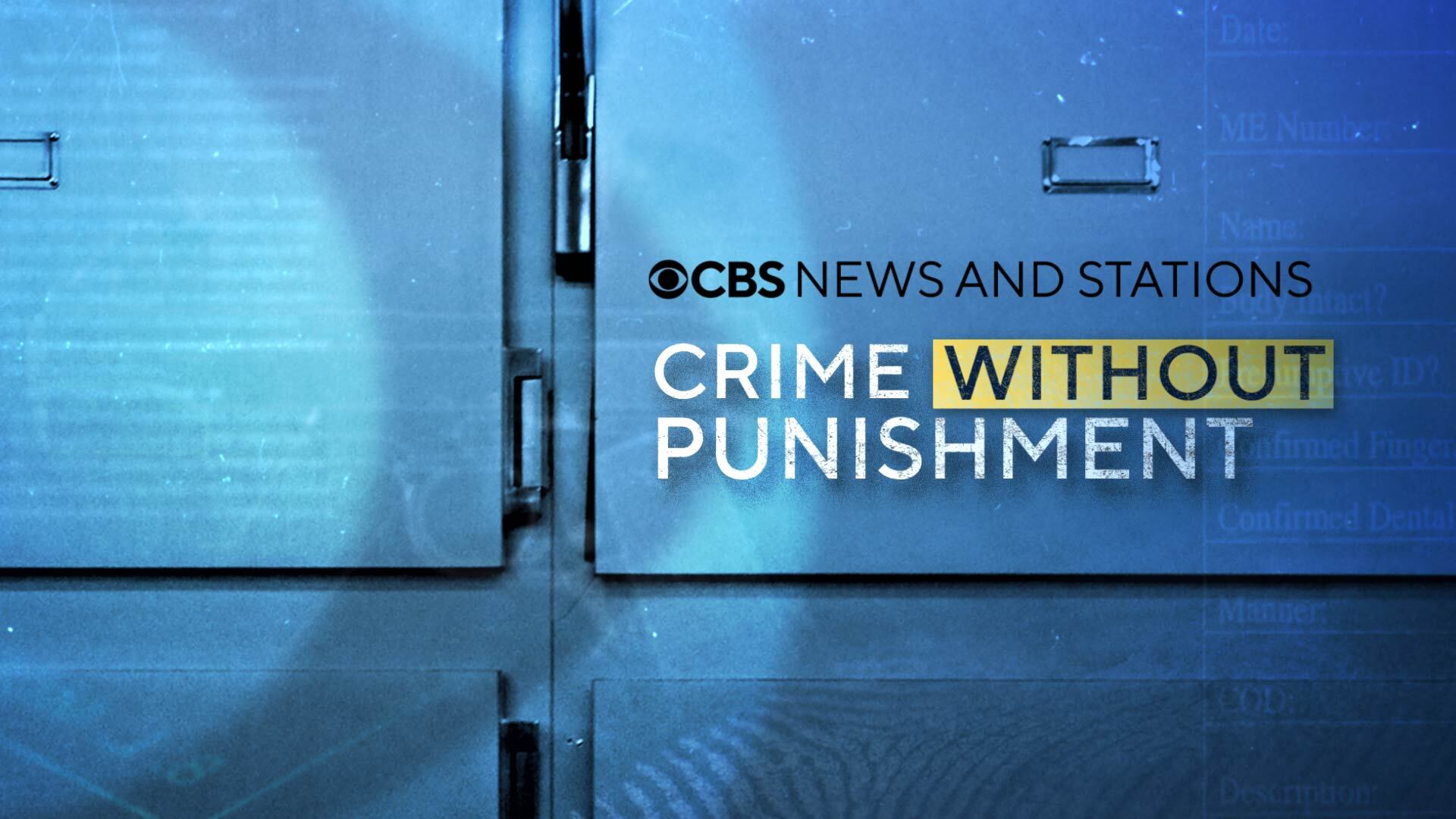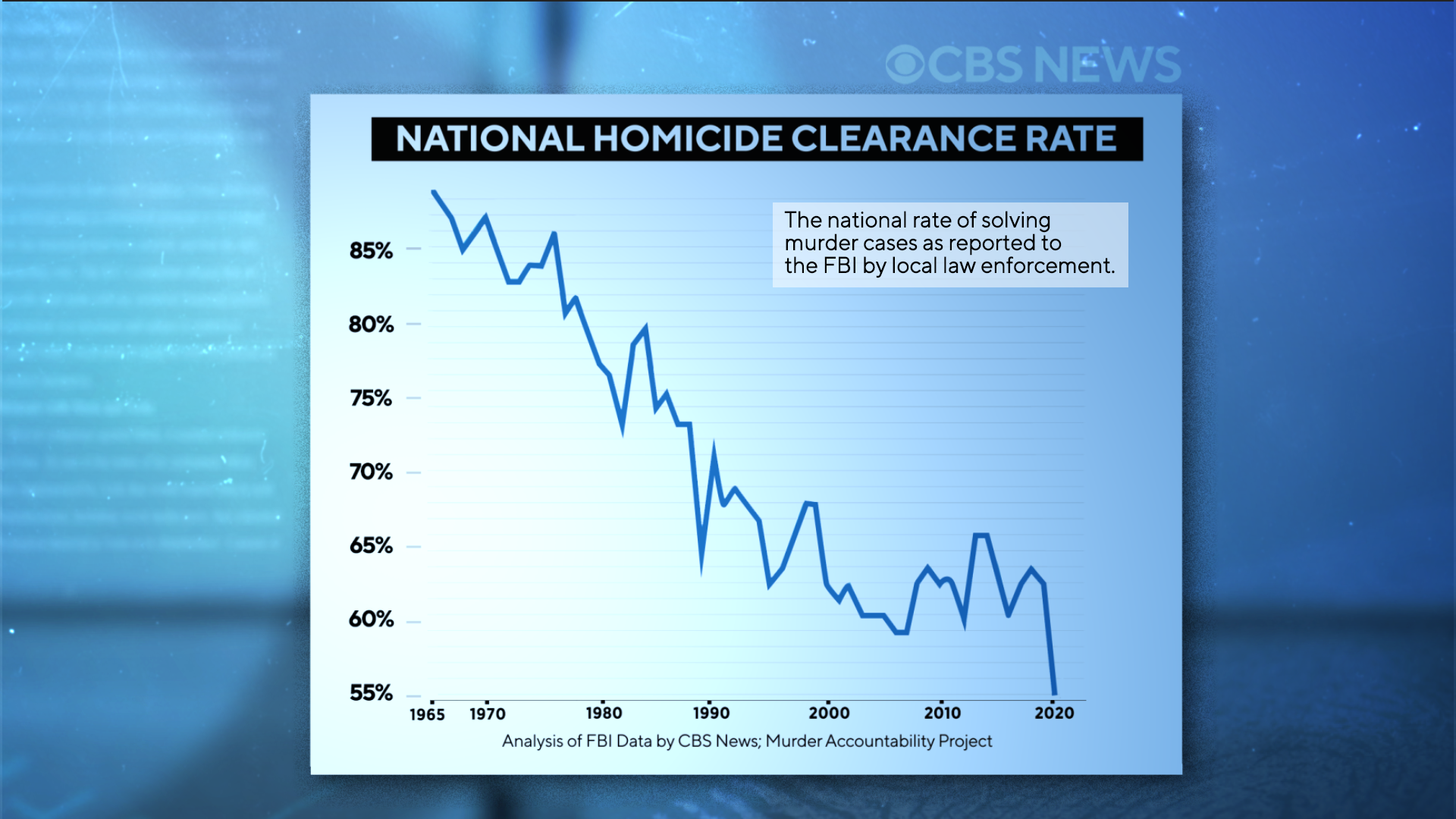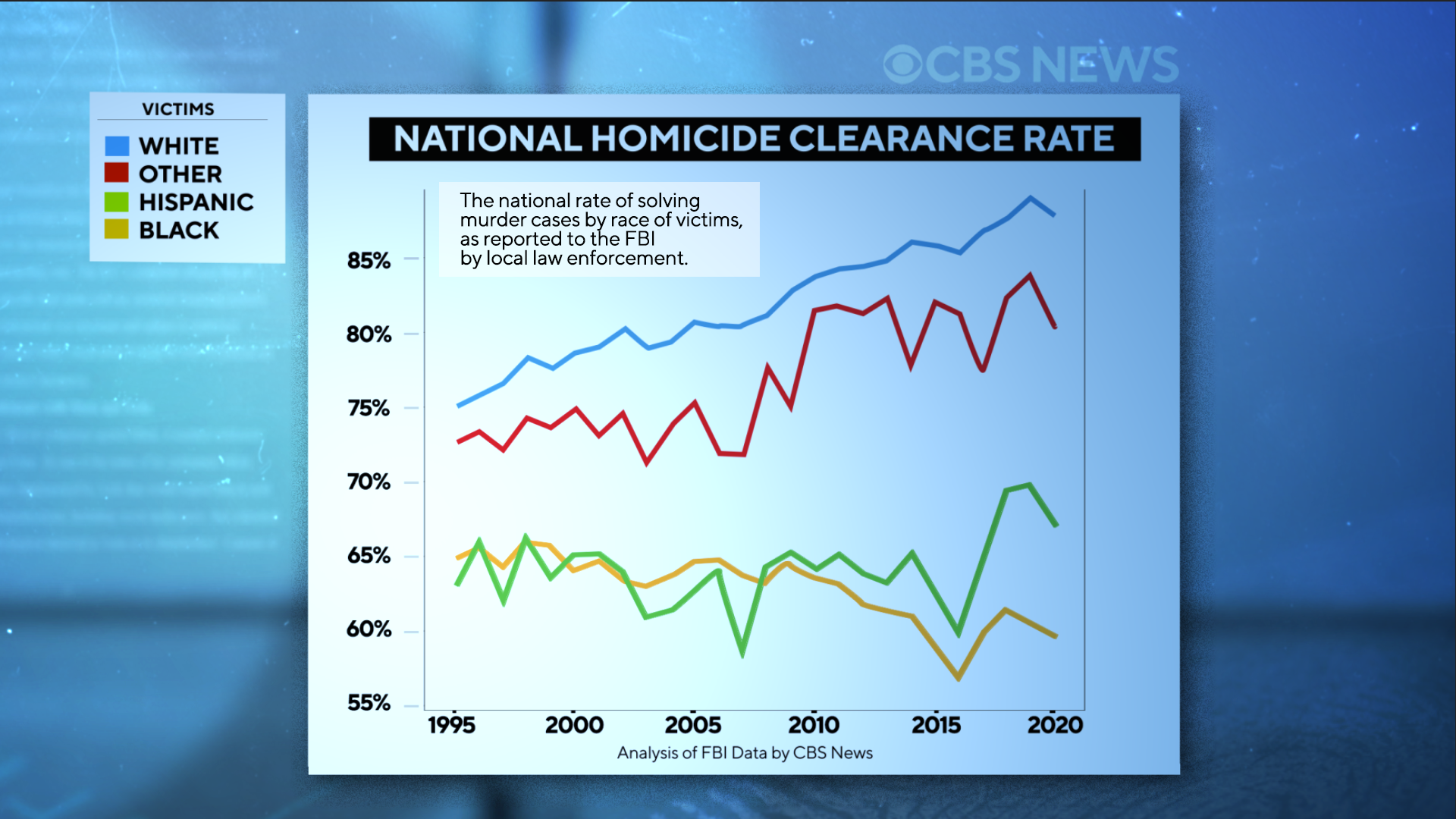Release
CBS NEWS AND STATIONS LAUNCHES EXCLUSIVE DATA-DRIVEN INVESTIGATION INTO THE GROWING NUMBER OF MURDERS GOING UNSOLVED ACROSS THE COUNTRY BEGINNING TODAY

“Crime Without Punishment” Is the First Joint Investigation Between the National, Local and Streaming News Teams with Original Reporting and Data Analysis from the CBS News Investigative Unit and the CBS Local News Innovation Lab
Cross-Platform Initiative Spans CBS News, CBS Stations and Journalists Across the Country, and a New “CBS Reports” Documentary Airing Tomorrow on CBS News Streaming
Click Here to Read More
Watch a Preview of “Crime Without Punishment”
CBS News and Stations today launched an exclusive data-driven investigative series to explore why police are seeing a steady decline in the percentage of homicide cases solved across the country. “Crime Without Punishment” is the first joint investigation between the newsgathering teams at CBS News, CBS Stations and CBS News Streaming. It is a collaboration between the CBS News Investigative Unit and the CBS Local News Innovation Lab, which worked together to analyze data and provide information to fuel reporting across all platforms.
Through original data journalism, the “Crime Without Punishment” initiative drills in on a startling trend: police are closing a smaller share of murder cases than at any other time in American history, and that failure is far more likely to occur when the victim is Black. The idea that police were delivering strikingly different results depending on the race of the victim was an injustice CBS News and Stations journalists set out to document, investigate and understand. Through the eyes of victims and the police, “Crime Without Punishment” looks at the sobering reality of a justice system in crisis, puts faces to the staggering statistics, and examines why, for roughly half of the people murdered in America, no one is arrested for the crime.
CBS News chief investigative and senior national correspondent Jim Axelrod is leading the series, which began today on CBS MORNINGS and continues this week on the CBS EVENING NEWS WITH NORAH O’DONNELL, the CBS WEEKEND NEWS, CBS News Streaming, CBS Newspath, CBS News Radio and CBSNews.com/unsolved.
CBS stations will broadcast and stream original reporting in 14 major markets that will include data analysis of the homicide clearance statistics for each market, interviews with local law enforcement officials who will respond to the questions and issues raised by the CBS News and Stations investigation, and interviews with criminal justice experts who have been sounding alarms about falling case closure rates. The coverage will span all local newscasts with on-air coverage throughout the week.
CBS News Streaming will premiere a 30-minute CBS REPORTS documentary, “Crime Without Punishment: Fighting for Justice,” tomorrow, Thursday, June 30 on CBS News Streaming, centered on a case in Jackson, Miss. where an arrest occurred after CBS News focused attention on the case.
“Crime Without Punishment” builds on CBS News and Stations’ ongoing coverage and polling about crime in the country, with a sharp focus on the increasing number of murder cases never closed and how that reverberates in community after community. The cross-platform initiative is being led by: CBS News and Stations presidents and co-heads Neeraj Khemlani and Wendy McMahon; CBS News executive vice president of newsgathering Ingrid Ciprian-Matthews; with Matthew Mosk, CBS News senior investigative editorial director; Chad Cross, vice president of content development at CBS Stations; and Nancy Lane, senior executive producer of CBS REPORTS and the senior vice president of programming and development for CBS News Streaming.
“We started this project to try and understand the ramifications of what we were seeing around us with the rise in violent crime, the mass shootings, the breakdown in trust between the police and the communities they serve,” said Mosk. “The project has now grown into something that touches nearly every corner of our newsroom. We wanted to understand the real-life consequences for the relatives of victims. We embedded with homicide detectives as they helped puzzle through the reasons for this trend. And we went in search of the experts who were already trying to find solutions.”
“The combined resources of CBS News and Stations allow us to report important and previously untold stories like this in a way no other news organization can,” said Cross. “This is the first of many joint efforts to put a national spotlight on a significant issue of concern and then have the teams at our Stations and data journalists at our Local News Innovation Lab advance our reporting across the local communities we serve.”
“The CBS REPORTS franchise has historically taken Americans inside the unseen issues of the country, and we continue that tradition of telling important stories with this new half-hour documentary,” said Lane. “The ‘Crime Without Punishment: Fighting for Justice’ documentary will give viewers a first-hand account from those personally affected by the severe drop in homicide clearance rates and the pain of justice that never comes.”

 These graphs, which visualize the national clearance rate, show CBS News and the CBS Local News Innovation Lab’s analysis of FBI data and historic arrest figures gathered by the nonprofit Murder Accountability Project that reveals that over more than five decades, the rate of murder cases solved has fallen by more than 30 percentage points. The analysis shows racial disparities have widened in what murder cases are solved across the country.
These graphs, which visualize the national clearance rate, show CBS News and the CBS Local News Innovation Lab’s analysis of FBI data and historic arrest figures gathered by the nonprofit Murder Accountability Project that reveals that over more than five decades, the rate of murder cases solved has fallen by more than 30 percentage points. The analysis shows racial disparities have widened in what murder cases are solved across the country.
The CBS News and Stations cross-platform initiative “Crime Without Punishment” will also include the following:
-
CBS MORNINGS, the CBS EVENING NEWS WITH NORAH O’DONNELL, CBS NEWS RADIO and CBS NEWS STREAMING are delivering reports today from Jim Axelrod, who joins the Philadelphia homicide unit on the week of another mass shooting. We hear their frustration as the crime rate rises and the stack of cases confronting them grows.
-
Tomorrow, June 30, on CBS MORNINGS, Jim Axelrod talks with more than two dozen relatives of murder victims in Jackson, Miss. – many frustrated with police, and some who have taken it upon themselves to investigate.
-
Also tomorrow, on CBS NEWS STREAMING, Axelrod will join the morning and afternoon shows to discuss the investigation and his reporting. CBS News Streaming will also feature the best of the local stations’ reporting on the issue, and those reporters will join the stream live.
-
Tomorrow on the CBS EVENING NEWS WITH NORAH O’DONNELL, Jackson, Miss. detectives make arrests in a murder case after CBS News raises questions about the case – and hear allegations that police ignored the mother who identified the suspect a year earlier. Through extensive interviews, viewers will hear about frustrating caseloads for detectives, as they contend with the trend of violence.
-
Also, the CBS REPORTS documentary “Crime Without Punishment: Fighting for Justice” premieres tomorrow, June 30 (8:00 PM, ET) on CBS NEWS STREAMING and on 14 major CBS stations throughout the country. The half-hour special follows the story of one mother’s quest for justice in Jackson, Miss.
-
On Friday, July 1 on CBS MORNINGS, Axelrod follows a unit inside federal law enforcement that is trying to throw powerful resources behind the Baltimore City Police as they seek to clear murder cases in one of the U.S. cities hardest hit by violence.
-
On Friday, July 1, the CBS NEWS RADIO program and podcast “America Changed Forever,” hosted by CBS News chief justice and homeland security correspondent Jeff Pegues, will highlight “Crime Without Punishment” reporting from throughout the week and feature an in-depth conversation between Jeff Pegues and Jim Axelrod. You can listen to “America Changed Forever” Saturdays on SiriusXM POTUS Channel 124 at 11:00 AM, ET/8:00 AM, PT, on your local CBS News Radio affiliate and wherever you get your podcasts.
-
The CBS WEEKEND NEWS will look at the personal and professional experience of retired Dallas Police chief Renee Hall, who helped improve the murder clearance rate during her tenure, and who has special insight into this challenge as she lost her father to violence – a crime that remains unsolved to this day.
-
CBS NEWSPATH will provide CBS affiliates with additional reporting to support and continue the series on their broadcast and digital platforms.
The reporting from CBS Stations will include:
-
WCBS New York: WCBS tackles the issue of race disparities in New York clearance rates. Like many cities in our project, NYPD’s clearance rate has been significantly higher for white victims over the last decade, compared to Black and Hispanic victims. WCBS reporter Ali Bauman asks NYPD the reasons for the disparities. She also obtained staffing data to investigate how diverse the NYPD is.
-
KCBS Los Angeles: KCBS reporter Ross Palombo uses data to describe how two murder cases in one family had two different outcomes. He interviews a mother who lost both of her sons to murder. In one case, justice was served; in the other, police never got the gunman.
-
WBBM Chicago: WBBM’s investigation reveals the numbers behind “exceptional clearance.” In 2021, the Chicago Police Department’s clearance rate was reported as 48 percent, but its actual arrest rate for homicides was only 24 percent. WBBM reporter Megan Hickey interviewed the families of victims whose cases were “exceptionally cleared” but no one was ever charged or held responsible. She asks Chicago Police why more than half of closed cases in Chicago were cleared this way last year.
-
KYW Philadelphia: In Philadelphia, KYW reporter Joe Holden gets answers about the city’s falling clearance rate from the head of the Philadelphia Police Department. In a sit-down interview, the police commissioner says with a recent surge in killings, detectives now have larger caseloads than ever before.
-
KTVT Dallas/Fort Worth: KTVT’s investigation exemplifies the data inconsistencies Stations discovered between the FBI and local police. KTVT reporter Andrea Lucia pressed Dallas Police for answers about discrepancies in their clearance rate reporting, which has prompted the department to fix the errors and recommend a department-wide audit.
-
KPIX San Francisco: KPIX reporter Wilson Walker presents a tale of two cities, comparing the outcomes of Oakland Police and San Francisco Police. One has a low clearance rate and the other has a high clearance rate.
-
WBZ Boston: WBZ reporter Cheryl Fiandaca investigates Boston’s extremely low local clearance rate from all angles. The story touches on data inconsistencies between local police and FBI, as well as race disparities. Police explain why they believe it’s getting more difficult to solve homicide cases in Boston.
-
WKBD Detroit: WKBD journalists let their interview subjects tell the story in their own voices, including a Detroit mother who saw her son lying on the ground, shot multiple times. While many cases go unsolved, Detroit Police explain how they aim to establish community trust with their “neighborhood canvass” strategy after each murder.
-
WCCO Minneapolis-St. Paul: In Minneapolis, reporter Jennifer Mayerle tells the story of a three-year-old boy murdered and how his killer was never arrested. The story has compelling sound from his grieving mother, fighting for change.
-
WFOR Miami: A mother who lost her daughter in 2015 believes witnesses often cause cases to go cold. She tells WFOR reporter Ted Scouten community members are afraid to come forward with information, in fear of retaliation. Police in Miami agree. They also explain why murders with high-capacity weapons are more difficult to solve than others.
-
KCNC Denver: The homicide clearance rate of the Denver Police is above the national average. And while detectives in Denver consistently arrest suspected murderers, that hasn’t always been the case. KCNC reporter Shaun Boyd describes the changes police made over the years to successfully solve homicide cases, and how the killing of a Denver Broncos player may have helped spur action.
-
KOVR Sacramento: KOVR reports a solutions-focused story, as an example of how one police department is having success solving murder cases. Detectives in Sacramento tell KOVR reporter Julie Watts the reasons for their relatively high clearance rate in recent years.
-
KDKA Pittsburgh: In Pittsburgh, police now rely more heavily on technology to solve homicides than going out and speaking with the community. KDKA reporter Andy Sheehan finds out why. He also hears from a criminologist and former FBI agent, who says a low clearance rate sends a dangerous message to potential killers that they might get away with murder.
-
WJZ Baltimore: WJZ reporter Mike Hellgren shares the story of a grandmother still waiting for answers after losing her grandson in 2019. WJZ explores why Baltimore has a low arrest rate by directing questions to the city’s police commissioner and Maryland’s governor. Our data analysis also found that the number of cleared homicides involving white victims in Baltimore City has been higher than cases of Black victims nearly every year since 1995.
***
Press Contacts:
Lance Frank, CBS News Communications
Hugo Rojo, CBS News Communications
April Andrews, CBS News Communications – Digital and Streaming
Mike Nelson, CBS Stations Communications
-
Publicity
Anna Gibson
GibsonA@cbsnews.com -
Publicity
Samantha Graham
212-975-6795 GrahamS@cbsnews.com
